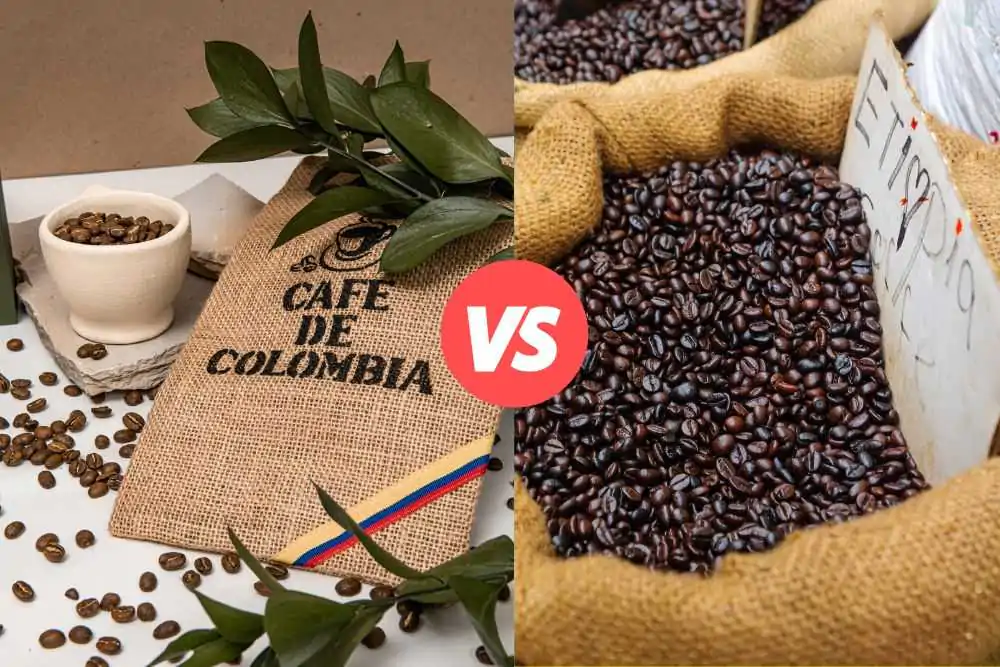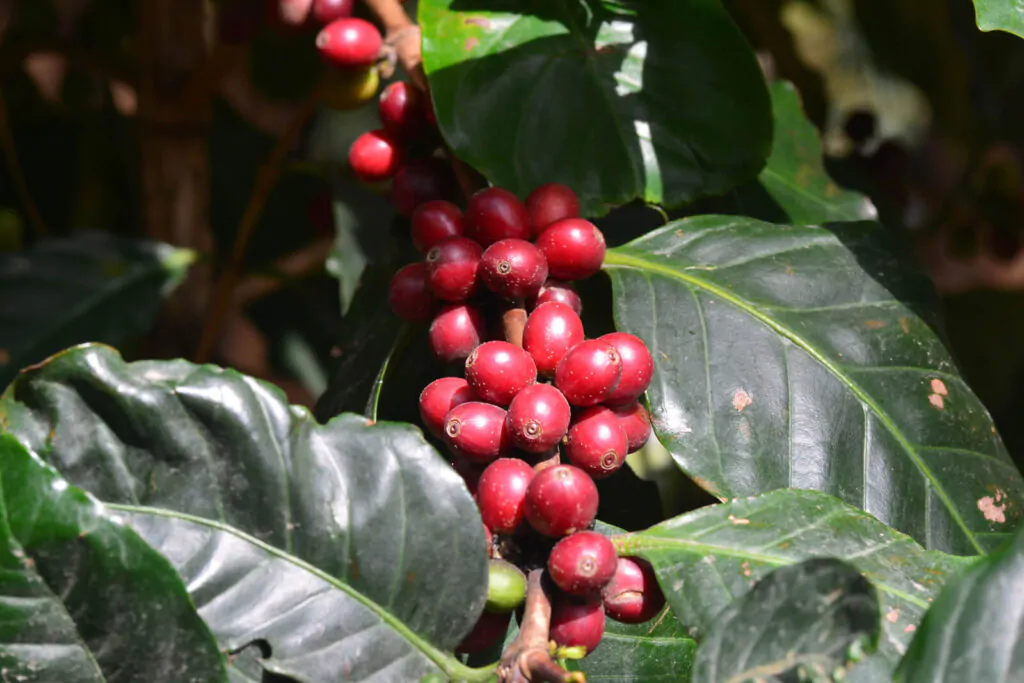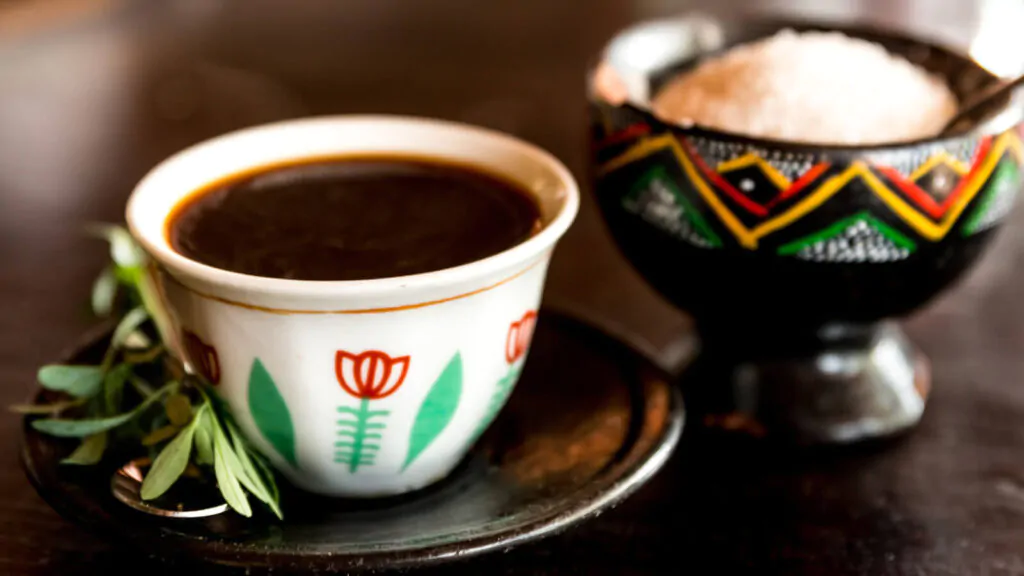Both Colombia and Ethiopia produce top-class coffee beans, which is why it is hard to choose. Read our Colombian vs. Ethiopian coffee guide to learn more.

Rare were the coffee bloggers and reviewers back when the internet was in its infancy. Learning more about this wonderful drink in those days meant scouring the library for books, checking every page of Yahoo! search, or trying it out for myself.
You can’t blame me for my initial notion that Colombian coffee and Ethiopian coffee were the “strong” variants back then. I couldn’t be more wrong. Learning is beautiful, so our Colombian vs. Ethiopian guide will help open your mind.
- What Is Colombian And Ethiopian Coffee?
- What Colombian Coffee And Ethiopian Coffee Have In Common
- Colombian Vs. Ethiopian Coffee: The Differences
- What Is Better About Colombian Coffee?
- What Is Better About Ethiopian Coffee?
- Who Should Get Colombian Coffee (And Why)?
- Who Should Get Ethiopian Coffee (And Why)?
What Is Colombian And Ethiopian Coffee?
Colombian coffee and Ethiopian coffee are coffee beans grown in those regions. Colombia and Ethiopia are located near the equator, making their tropical climates ideal for coffee plants to blossom. Both coffee beans are known for giving an aromatic and delicious cup of Joe, the intricacies of which you will find out in a while.
What Colombian Coffee And Ethiopian Coffee Have In Common

Most Colombian and Ethiopian coffee contains Arabica beans, which explains the richness in flavor. This is supported by the fact that both coffee beans have a light to medium body type. Interestingly enough, their flavor profile and acidity levels couldn’t be any different due to several factors, such as where they were grown and how they were processed.
Colombian Vs. Ethiopian Coffee: The Differences
| Colombian Coffee | Ethiopian Coffee |
| Low acidity levels. | More acidic. |
| Flavor profile tends to be sweeter, having caramel or chocolate notes with nutty, smoky, and or floral hints. | Generally, the flavor profile leans more fruity and tangy with notes of wine, citrus fruits, and berries. Some variants have grassy and floral undertones. |
| Usually wet-processed, meaning the cherries were removed before the coffee beans were dried. | Usually dry-processed, meaning the beans were dried with the cherries intact. |
What Is Better About Colombian Coffee?
The flavor of Colombian coffee will depend on which region the beans were grown and how they were processed and roasted. Those grown in the northern regions tend to be full-bodied and thicker in texture, with the sweet notes of chocolate and caramel more apparent. Coffee harvested in the southern regions grows in higher altitudes, raising its acidity levels (albeit not as high as the Ethiopian) and making the flavor fruitier.
Despite these factors, its taste and texture closely resemble that of a traditional cup of Joe with extra steps. This allows your palate to adjust easily to the flavor. If you have decided as early as now to go for Colombian coffee, you might want to check out our list of the best Colombian coffee brands of 2022 and get your money’s worth!
What Is Better About Ethiopian Coffee?
Ethiopian coffee is what you may call diverse and complex. As the country is deemed the birthplace of coffee, you can expect that most, if not all, of the regions, have their own variants of beans with different flavor profiles and notes. Such is their love for java that Ethiopians have a traditional coffee ceremony at certain times of the day where they convene to discuss any state of affairs.
Coffee lovers will agree that Ethiopian coffee is bolder and more robust. When processed naturally, the bright, fruity, and wine-like flavor is highlighted. When wet-processed, floral and herbal hints tend to be the most prominent.
As these coffee beans are delicate, the type of roast and how it is brewed will dictate which notes and undertones will come out. For instance, a medium to medium-dark slow roast will bring out more flavor from an Ethiopian coffee bean compared to a Colombian, which is more forgiving. It is not overwhelmingly bitter, as the profile suggests, as the complex notes of the beans work together to bring a delicious cup with every brew.

Who Should Get Colombian Coffee (And Why)?
Coffee lovers looking for the traditional flavor of coffee with an added twist will love Colombian coffee. Due to its low acidity levels, it is an ideal cup of Joe for those that suffer from hyperacidity. Additionally, because of its chocolate and caramel notes, Colombian coffee is perfect for those with a sweet tooth.
Who Should Get Ethiopian Coffee (And Why)?
Those who love getting a brewed awakening, especially in the morning, might want to opt for Ethiopian coffee. The robustness and complexity of the flavor this java brings make for an exciting and unique experience that every coffee lover will enjoy. Want to learn more about Ethiopian Java? You can check out our piece on Geisha coffee!

